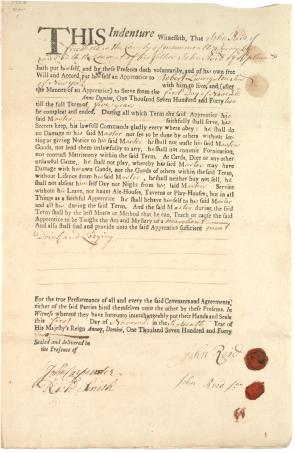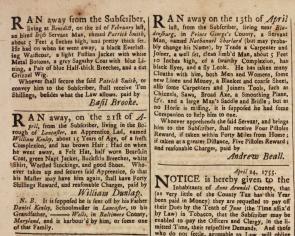

Colonial Americans engaged in many forms of unfree labor, with great numbers of youths moving away from their families to become servants or apprentices. The terms of their service were spelled out in contracts called indentures, legal agreements that were entered into by the child’s parent(s) and the child’s new master. These agreements varied, but certain terms were standardized enough that pre-printed forms were often used.

In November 1742, John Reid Jr. of New Jersey bound himself to Robert Livingston Jr., a member of a prominent New York family, to learn the merchant trade. Reid was to receive “sufficient meat Drink and Lodging” for five years and “be taught the Art and Mystery of a merchant.” In exchange, he and his father pledged that Reid would “gladly every where obey” Livingston’s “lawfull Commands” and “do no damage to his said Master,” and “not Contract Matrimony” or “absent himself Day nor Night from his said Masters Service without his Leave.” Servants who did leave without permission of their master were considered runaways and their master placed advertisement in newspapers. These ads are very similar to runaway slave advertisements.
Benjamin Franklin, who was treated harshly by his much-older brother when he was indentured to him, later wrote in his autobiography that his brother’s treatment “might be a means of impressing me with that aversion to arbitrary power that has stuck to me through my whole life.” Colonists’ familiarity with servitude probably contributed to their suspicions of power and their fear that America would be subjected to Britain’s arbitrary rule and autocratic trade and tax policies.
THIS Indenture Witnesseth, that John Reid of freedhold in the County of Monnmouth Jersey by and with the Consent of his father John Riad of S d place hath put himself, and by these Presents doth voluntarily, and of his own free Will and Accord put himself an Apprentice to Robert Livingston Jun of New York with him to live, and (after the Manner of an Apprentice) to Serve from the first Day of Novemb r : Anno Domini, One Thousand Seven Hundred and Forty two till the full Term of five years be compleat and ended. During all which Term the said Apprentice his said Master faithfully shall serve, his Secrets keep, his lawfull Commands gladly every where obey: he shall do no Damage to His said Master nor see to be done by others without letting or giving Notice to his said master he shall not waste his said Masters Goods, nor lend them unlawfully to any, he shall not commit Fornication, nor contract Matrimony within the said Term. At Cards, Dice or any other unlawful Game, he shall not play, whereby his said Master may have Damage with his own Goods, nor the Goods of others within the said Term, without Lisence from his said Master, he shall neither buy not sell, he shall not absent himself Day nor Night from his said Masters Service without his Leave, nor haunt Ale-Houses, Taverns or Play-Houses; but in all Things as a faithful Apprentice he shall behave himself to his said Master and all his during the said Term. And the said Master during the said Term shall by the best Means or Method that he can, Teach or cause the said Apprentice to be Taught the Art and Mystery of a Marchent And also shall find an provide unto the said Apprentice sufficient meat Drink and Lodging
For the true Perfomance of all and every the said Covenants and Agreements, either of the said Parties bind themselves unto the other by these Presents. In Witness whereof they have hereunto interchangeably put their Hands and Seals this first Day of Novemb r . in the Sixteenth Year of His Majesty’s Reign Annoq; [sic] Domini, One Thousand Seven Hundred and Forty Two,
Sealed and delivered in
the Presence of John Reid
John Carpenter John Reid J nr :
Rich d Smith
Read the document and the document introduction and apply your knowledge of American history in order to answer these questions.